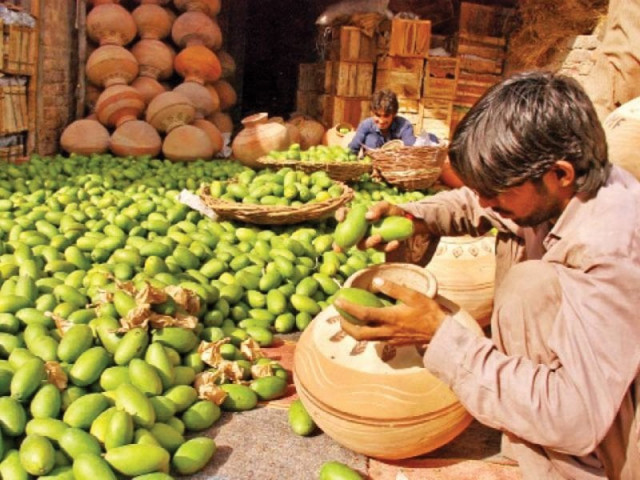Exports to the EU: Mangoes can now be traced back to farms or even trees
Pakistan introduces global practice to avoid curbs.

The restrictions on Indian products have caused widespread fears among Pakistani fruit and vegetable exporters. PHOTO: FILE
Private as well as state officials believe that these safety measures will bring revolutionary changes in the industry as the government desires to apply the model to export of other fruits and vegetables.
Talking to The Express Tribune, Department of Plant Protection (DPP) Director General Dr Mubarak Ahmed said the department had already granted clearance certificates to around 10 mango farms in Sindh and 14 in Punjab.
DPP – one of the 14 organisations working under the Ministry of National Food Security and Research – is responsible for providing all-encompassing quarantine facilities to fruit growers.
According to Ahmed, this is an ongoing process and the department will continue to survey and register mango farms until June 15.
DPP officials have surveyed around 90 farms each in Punjab and Sindh and asked their owners to improve conditions if they want to get the certificate for export to the EU.
“We will inspect more farms next week and grant certificates if their performance is satisfactory,” Ahmed said.
The government and fruit exporters have ramped up efforts to improve farm conditions after warning from the EU. This season, Europe has banned import of five types of fruits and vegetables from India over presence of pests and fruit flies in consignments.
The restrictions on Indian products have caused widespread fears among Pakistani fruit and vegetable exporters considering the fact that they export almost similar types of fruits and vegetables.
The EU has also warned Pakistan that presence of fruit flies and other diseases could lead to a blanket ban on the export of fruits and vegetables.
“We are extra cautious from this year and are trying hard to only export quality fruit to the EU,” Ahmed said. “We know that any export curbs could take six to 10 years to get lifted. This is something that the country and its exporters cannot afford.”
Though officials believe that the issue of tracing the origin of the fruit will cause a dip in mango exports in the short term, it is acceptable compared to a ban on export to high-value markets.
In the new mechanism, end-users can trace the farm supplying the fruit which will help both the importer and exporter in case of any complaints about quality.
“I am sure that the new system will increase credibility of fruit exporters in the EU. It may result in a drop in exports in the short them, but it will lead to increase in shipments, especially to the bigger market of EU,” Pakistan Fruit and Vegetable Exporters, Importers and Merchant Association Co-chairman Waheed Ahmed said.
From this year, the government has forced the exporters to sell only Hot Water Treated (HWT) mangoes to the EU. This way the fruit fly threat can be minimised while the exporters that apply new safety features will get a premium price.
According to Waheed, the percentage of traceable mangoes will not be more than 1% this year, but he was sure that more exporters would opt for this system in coming years.
“I think Pakistan can easily shift all mango exports to the traceable system in three to four years.”
Pakistan has already started shipping mangoes from May 25 and the annual export target is 175,000 tons that will earn about $65 million.
Europe is one of the biggest markets where Pakistan exports about 24,000 tons annually but this year sales are expected to decline because of the new safety measures.
Published in The Express Tribune, June 2nd, 2014.
Like Business on Facebook, follow @TribuneBiz on Twitter to stay informed and join in the conversation.



















COMMENTS
Comments are moderated and generally will be posted if they are on-topic and not abusive.
For more information, please see our Comments FAQ